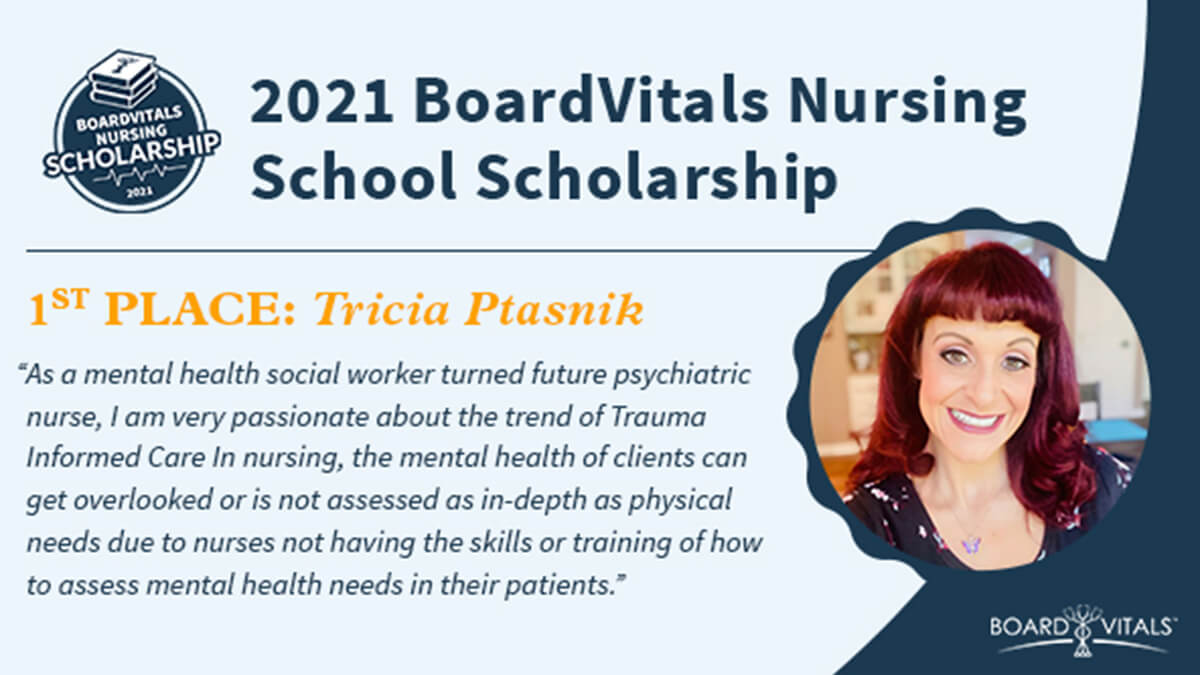We received hundreds of submissions for the 2021 BoardVitals Nursing School Scholarship. Applicants were asked to answer the question “Can you describe a nursing industry trend that’s caught your eye? Why does it interest you?”
Our 1st place winner, Tricia Ptasnik, is a mental health social worker who is currently pursuing her Master’s as a Mental Health Nurse Practitioner. For her scholarship essay, she wrote about trauma-informed care and how it impacts her patients. As our first-place winner, Tricia was awarded $2,500 to put towards educational expenses as she reaches her goal of working as a nurse practitioner. Congratulations to Tricia and to all of our winners! Check out Tricia’s essay below.
As a mental health social worker turned future psychiatric nurse, I am very passionate about the trend of Trauma-Informed Care. In nursing, the mental health of clients can get overlooked or is not assessed as in-depth as physical needs due to nurses not having the skills or training of how to assess mental health needs in their patients. At the current hospital system in which I work, there has been a movement to provide Trauma-Informed Care training to all nursing staff. Whether or not a patient has a diagnosed mental health condition does not exclude them from having a trauma history that needs to be taken into consideration. Humans are holistic beings whose mental health impacts the physical and emotional well-being of patients and vice-versa. Research on childhood trauma with the Adverse Childhood Experiences (ACE) score study demonstrated a strong link between the number of traumatic experiences a person has and their chronic health conditions such as asthma, growth problems, heart disease, cancer, diabetes, and hypertension. Trauma changes how the body and brain work, so nurse must be aware of how past trauma has potentially played a huge role in the current mental and physical health problems of patients.
When nurses receive training on the Trauma-Informed Care approach, they become aware of factors leading to re-traumatization and be able to view the patient with more empathy instead of frustration. Nurses who are trauma informed realize that there are many events and factors which have led the patient to where they are in the current moment. Trauma-informed nurses also know that they must be mindful not to make judgments about patient behavior, emotional reactions, or mental states because there are aspects to a person’s history that are unknown to the nurse. Trauma can look like resistance to treatment, non-compliance, anger, constantly ringing call light, and somatization. The nurse must take into consideration that any patient may have a trauma history and can be retraumatized due to inadequate treatment approaches by the nurse. For example, probing someone details about a trauma or asking a person to list traumas is not therapeutic. Trauma-informed care means that the nurse must be able to identify a person’s possible triggers and be mindful in providing supportive care that advocates for best interest of the patient. The nurse must focus on supporting patient now through establishing safe environment, building rapport, using advocacy as needed, displaying empathy, using therapeutic communication, and providing affirming care. I have trained extensively in Trauma-Informed Care and have seen first-hand how this approach supports patient outcomes. I look forward to my future work as a psychiatric nurse and want to help educate all nurses on how to be trauma informed in their practice. Nurses are the largest group of medical care providers in the United States, so if all nurses are trained in trauma-informed care, patients can be supported to continue healing from past traumas that have caused mental and physical health problems.




